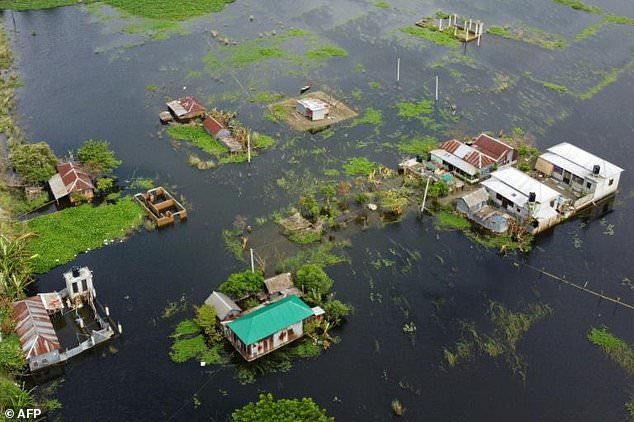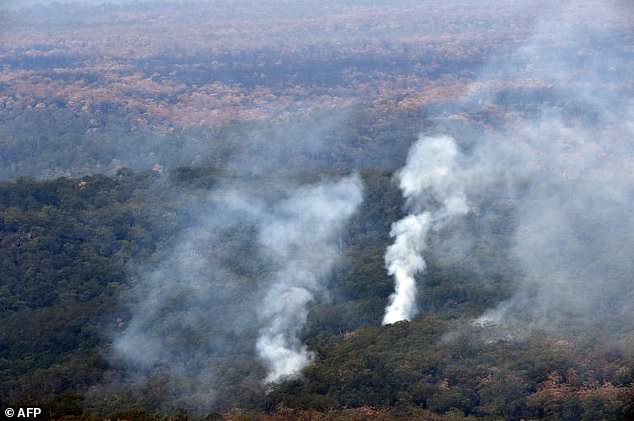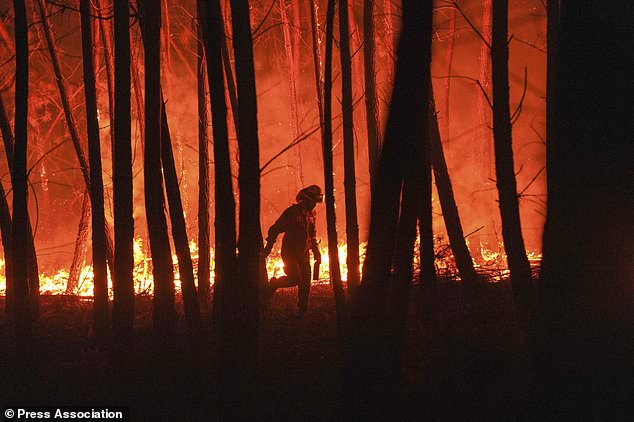Over the past 50 years there has been a fivefold increase in the number of disasters caused by weather and climate change - resulting in two million deaths, study finds.
A new report coordinated by the World Meteorological Organization (WMO) found 11,000 disasters have led to $3.6 trillion (£2.76 trillion) in economic damage since 1970.
Extreme weather and climate events have increased in frequency, intensity and severity as result of climate change, the UN-backed agency discovered.
While the average number of deaths recorded for each disaster has fallen by a third during this period, the number of recorded disasters has increased five times.
The WMO has called on the US to set clear and ambitious goals to become carbon neutral - following similar moves by the EU and China, as well as more global efforts towards forecasting impending climate disasters before they happen.

Chinese President Xi Jinping announced at the UN General Assembly last month that China aimed to become carbon neutral by 2060, while the European Union has pledged to achieve such status by 2050.
'All in all I think that this announcement is great, since at least European Union countries and China are now sharing common reason, that's very good news.
'And I hope that also the US will join that club in the near future,' Petteri Taalas, WMO Secretary-General, told a briefing in Geneva.
These measures, such as becoming carbon neutral, are all measures needed to limit global temperature rises from climate change by 2100.
Scientists warn that even with the changes currently being made, global temperatures will continue to warm over the next five years, and may even temporarily rise to more than 2.7F above pre-industrial levels in one of those years.
Scientists have set the 2.7 Fahrenheit ceiling - agreed as part of the Paris Agreement on climate change - as the maximum temperatures can rise over the next 100 years to avoid catastrophic climate change.

Even with drastic action, the climate is already changing and as the WMO reports, there has been a spike in extreme weather events - requiring efforts to reduce risk.
Mami Mizutori, from the UN Office for Disaster Risk Reduction, said risk management is important, and something the coronavirus pandemic put into the spotlight.
'To date, 93 UN member States have developed national strategies for disaster risk reduction, and in turn, disaster risk reduction is a top priority in all National Adaptation Plans devised under the Paris Agreement.
'This needs to continue; a key challenge will be to ensure that multi-hazard early warning systems can be adapted to take account of biological hazards alongside extreme weather events.'
The dramatic increase in these events has already led to millions requiring help - in 2018 about 108 million people required humanitarian aid due to storms, floods, droughts and wildfires, the WMO report found.
By 2030, that number could increase by almost 50 per cent,experts predict - at a cost of around $20 billion a year to the global economy.
The report, produced by 16 international agencies and financing institutions, explores ways governments can invest to strengthen resilience to weather events.
It stresses the need to switch to impact-based forecasting – an evolution from 'what the weather will be' to 'what the weather will do'.
The WMO says this move would allow people and businesses to act early based on the warnings, which could save lives and prevent damage.
Warning systems could alert people of a range of hazards including tropical cyclones and hurricanes, floods, droughts, heatwaves, forest fires, sand and dust storms, desert locusts, severe winters and glacial lake outbursts.
'Early warning systems constitute a prerequisite for effective disaster risk reduction and climate change adaptation,' said Taalas.
'Being prepared and able to react at the right time, in the right place, can save many lives and protect the livelihoods of communities everywhere.'

Professor Taalas said that while Covid-19 generated a large international health and economic crisis - climate change continues to pose an on-going and increasing threat to human lives, ecosystems and economies.
'Recovery from the COVID-19 pandemic is an opportunity to move forward along a more sustainable path towards resilience and adaptation in the light of anthropogenic climate change,' Professor Taalas said.
Nearly 90 per cent of Least Developed Countries and Small Island Developing States have identified early warning systems as a top priority.
However, many of them lack the necessary capacity and financial investment is not always flowing into the areas where investment is most needed, the report claims.
An increase in climate-related disasters indicates that upscaling of adaptation investment across the board is required, including specifically in reducing weather-water and climate-related risks through investments in improving access to risk information and multi-hazard early warning systems enhancement.